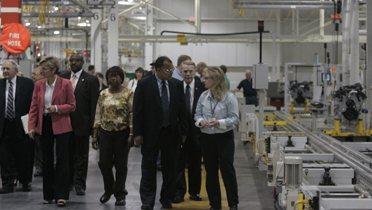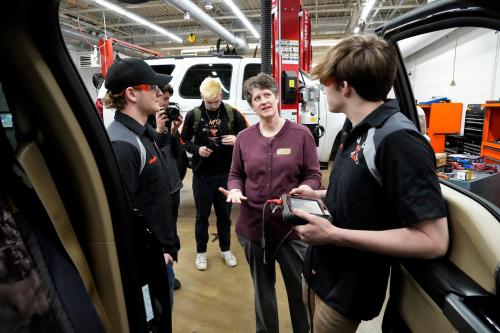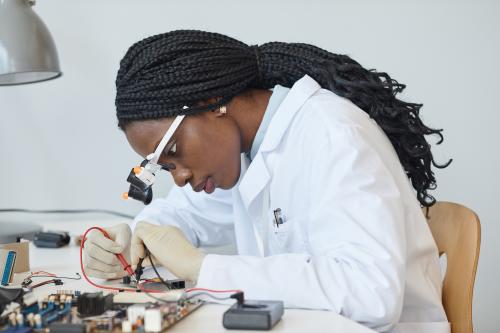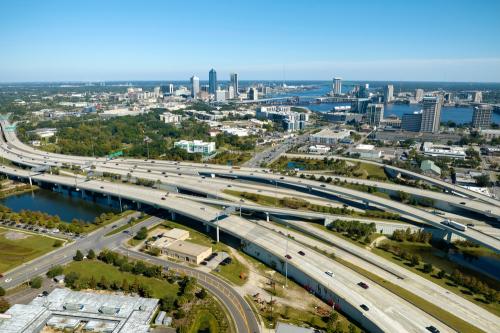As the American economy works its way slowly out of the Great Recession, a consensus is developing among public and private-sector stakeholders that simply re-constructing our old economy, one based on highly-leveraged domestic consumption, would be a serious mistake. The nation must instead focus on building the next economy, one that is oriented towards greater exporting, powered by a low-carbon energy strategy, driven by innovation, and that creates opportunities for all.
The Great Lakes region, too long tagged with the misleading nickname, The Rust Belt, could show the rest of the country the way forward to the next economy. Although battered by decades of declining economic health, and particularly by the recession, the nation’s heartland still has many of the fundamental resources—top-ranked universities, companies with deep experience in global trade, and emerging centers of clean energy research to name just a few—necessary to create a better, more sustainable, economic model.
This is not to disregard the region’s challenges. Its major metros have neither the economic development strategies nor the transportation infrastructure in place to fully take advantage of their export generating capacity. Many have inefficient physical development patterns, hollowed out urban neighborhoods, and concentrations of energy-intensive industries, and thus remain the epicenters of the nation’s fossil fuel-reliant economy. They lack the early-stage capital and other supports needed to strengthen existing firms and encourage start-up enterprises. And many suffer from deep, entrenched poverty, and have low educational attainment levels compared with their peers nationwide.
With both the strengths and challenges clearly in mind, this report provides a roadmap to economic recovery and transformation in the Great Lakes region, powered by its metropolitan areas. It describes how federal, state, and local stakeholders can leverage the region’s substantial assets to create a more productive, sustainable, and inclusive economic future.
The report finds:
First—The Great Lakes region, particularly its metropolitan areas, has significant resources essential to creating the next economy:
- Global Trade Networks —These networks, developed in large part by the auto industry, are critical to an export economy. Seven Great Lakes metros—Dayton, Detroit, Grand Rapids, Indianapolis, Milwaukee, Toledo, and Youngstown—are already among the country’s top 20 metro areas in terms of the share of their metro output that is exported. In particular, Great Lakes metros can capitalize on the growth potential of knowledge exports, as they have a concentration of top universities and associated medical complexes.
- Clean Energy/Low Carbon Capacity — Industries and universities in Great Lakes metros have created the research capacity and manufacturing prowess needed to build a clean energy, low-carbon economy. They have an outsized ability to lead on wind and solar renewable component manufacturing, and to capitalize on the “green-blue” potential of the Great Lakes and their waterways. The region’s research and innovation infrastructure is already spurring the development of new products and processes: Michigan, Ohio, and Illinois are among the top states in terms of green tech patenting, focused on new technologies in battery power, hybrid systems, and fuel cells.
- Innovation Infrastructure — Great Lakes metros have the industrial and institutional infrastructure necessary to power an innovation economy. The 21 largest Great Lakes metros alone are home to 32 major public and private research universities, which attract substantial federal research investment. The region produces approximately 36 percent of America’s science and engineering degrees each year. Between 2001 and 2007, an average of nearly one-third of the country’s patents each year were awarded to the Great Lakes states.
- Opportunities — Like innovation, opportunities grow in the presence of a robust educational network, such as the one that exists in the Great Lakes region. In addition to its public and land grant universities—the latter created in the 19th century to promote agriculture, science, and engineering—the region is also dotted with community colleges, which help the region’s workers develop skills and credentials necessary to secure jobs in the region’s industries, and in so doing maintain a pool of skilled employees to attract and support them.
Second — To realize the promise of the next economy, federal, state, and metropolitan leaders should join with the private and philanthropic sector to:
- Invest in the assets that matter: innovation, infrastructure, and human capital
- Devise new public-private institutions that are market-oriented and performance-driven.
- Reimagine metros’ form and governance structures to set the right conditions for economic growth
Voices from the Region
As part of this project, a number of scholars, practitioners, and policy experts from Great Lakes metros, and beyond, contributed their recommendations for how the federal government could support the region’s transition to the next economy. These recommendations, discussed in a series of briefs, focus on a range of issues including workforce policy, manufacturing, higher education, transportation, and water policy.
The Federal Role in Helping Incumbent and Dislocated Workers Adjust to the New Economy » (PDF)
Randall Eberts and George Erickcek
Strengthening American Manufacturing: A New Federal Approach » (PDF)
Susan Helper and Howard Wial
The Federal Role in Leveraging America’s Community Colleges » (PDF)
James Jacobs
The Federal Role in Supporting Auto Sector Innovation » (PDF)
Thomas Klier and Christopher Sands
The Federal Role in Supporting Public Universities’ Global Missions » (PDF)
Lou Anna K. Simon, Richard M. Foster, and John C. Austin
Developing a National Strategy for Goods Movement » (PDF)
Robert Puentes
Leveraging the Great Lakes Region’s Water Assets for Economic Growth » (PDF))
G. Allen Burton, Don Scavia, Samuel N. Luoma, Nancy G. Love and John C. Austin
Additional Resources
Hubs of Transformation: Leveraging the Great Lakes Research Complex for Energy Innovation »
James J. Duderstadt, Mark Muro, and Sarah Rahman
Turning Up the Heat: How Venture Capital Can Help Fuel the Economic Transformation of the Great Lakes Region »
Frank Samuel
Alan Mallach










